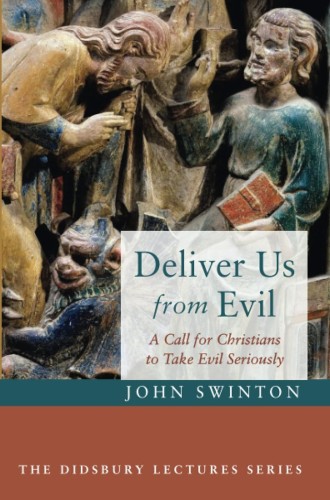A blessedly particular theology of evil
John Swinton writes about the nature of evil without a shred of metaphysical obscurity.
While some lectureships invite academics to speak to posterity and produce unread tomes, others seem to draw academics out to talk to ordinary civilians. (One of the most influential books in 20th-century liberal Protestantism, H. Richard Niebuhr’s Christ and Culture, originated as a short series of lectures at Austin Presbyterian Theological Seminary.) John Swinton’s new book falls into this second category.
Deliver Us from Evil began life as a series of lectures at Nazarene Theological College in Manchester, England, in 2020. They are blessedly, beautifully particular. They dive right into the murder of George Floyd, COVID and its repercussions, and the authoritarianism racing around Western democracies. The book also engages less recent but still haunting events, such as the Rwandan genocide. Swinton unpacks complex thought in ways that any reader will be able to comprehend: Hannah Arendt’s “banality of evil,” Walter Brueggemann’s blistering prophetic voice and Ellen Davis’s gentle one, and recent Pauline research on the powers and principalities by Susan Eastman. Swinton bravely tells us what he thinks without hiding behind academic jargon. His department at the University of Aberdeen has become a go-to for confidently voiced Protestant theology at a time when others flee confessional specificity.
Read our latest issue or browse back issues.
This book is not quite a theodicy. That graveyard of modern theology and philosophy often ends up trying to explain the unexplainable, and Swinton is too interested in God to fall into that trap.
Swinton writes about the nature of evil without a shred of metaphysical obscurity. He knows the tradition’s strong reliance on Augustine’s notion of evil as a privation of the good, but he prefers to speak in more Pauline terms of evil as a defeated enemy. He uses Eastman’s work on Paul to say that evil is multivalent. It has a personal component, and so it can be resisted. Yet it is also suprapersonal—the powers and principalities can only be defeated by Christ.
Perhaps Arendt’s portrait of Adolf Eichmann as a banal bureaucrat is not a surprising example, but Swinton’s subsequent example, pornography, is less expected: “It may seem banal and harmless to sit in our homes clicking away, but . . . [pornography use] significantly affects our mental health, changes the structure of our brains, and forces us to desire and indeed to crave things that are clearly not of God.” In this way, pornography “feeds directly into the propagation of radical evil.”
Swinton next turns to COVID circa early 2020. He doesn’t ask why God would permit such mass evil, although he assumes that God does permit it. He doesn’t blame governments that overstepped while doing their best. (One strength of the book is a recurring Niebuhrian sense that evil may well lie more in us than in others.) Swinton just asks whether normal is something we should ever long to return to. The virus revealed a level of evil we haven’t begun to repent of: the wealthy act out of perceived scarcity, and the more wealth we have, the more we hoard. Swinton also worries about the social calluses that develop with distancing, for genocidal regimes take advantage of such small, dehumanizing gestures to launch more murderous schemes.
On to Rwanda, and here Emmanuel Katongole’s groundbreaking work guides Swinton. Génocidaires are not moral relativists—they are moral purists of a sort, casting their projects in grandiose and binary terms. The tragedy of Rwanda is that it was viewed as an outstanding missionary success, with levels of Christian confession above 90 percent. Fellow Christians turned on one another murderously not because “tribes” had always hated one another, but because European colonizers made tribal divisions “natural,” backed by “science.” More people died in churches than anywhere else. “For a little while, we were no longer ordinary Christians,” one perpetrator confessed. Once again, Swinton pivots in an unexpected direction: we are now ignoring another genocide. The persecution of Christians globally is rampant, growing, and rarely denounced.
Swinton concludes with the virtues the church needs in order to pay attention to such overlooked evil. He notes that evil happens even when we have no evil intent; all we need to do is not pay attention. In response, he draws on Richard Foster to describe a sort of nonviolent spiritual warfare, like that of the martyrs. Others use such language quite violently—mass murderers in Norway and New Zealand claimed they were fighting for Christian civilization, although apparently without actually believing in God. The Eucharist is a central resource here, Swinton believes.
Drawing on Reformed theology, Swinton warns that the Eucharist can mislead as well as save. As in biblical Corinth, we might all claim to be at the Lord’s Supper but actually be eating private meals of self-interest. We need other practices too, like the strident truth telling of the lament psalms, which join the prophets’ voices to ours. In a refreshing refrain, Swinton states that practices are not enough—we also need the in-breaking power of God.
Deliver Us covers enormous territory. Some readers may quibble, especially if their preferred form of radical evil is unaddressed: sexual abuse and climate devastation are obvious omissions. Others may rather heckle legislatures than focus on internal Christian practices. Yet short books make no claim to exhaustiveness. The church desperately needs accessible and engaging theology, and that is precisely what Swinton offers here.






